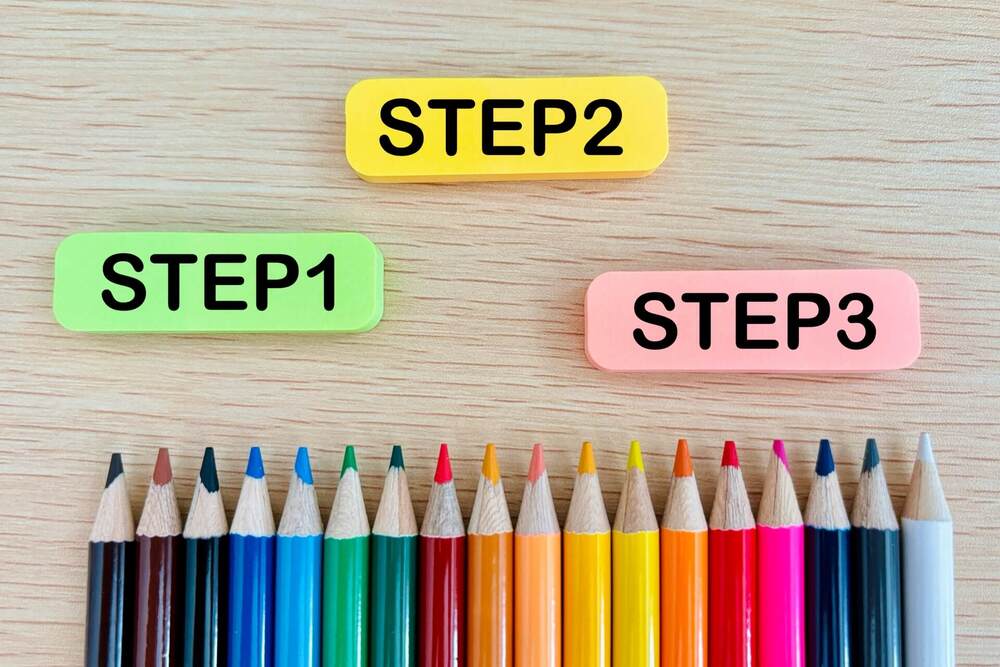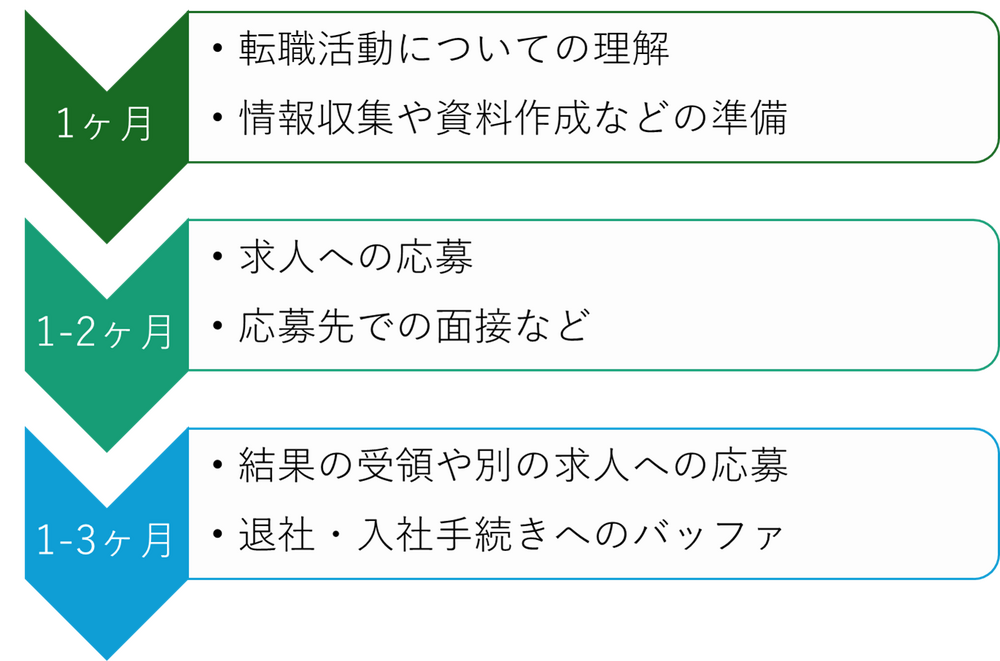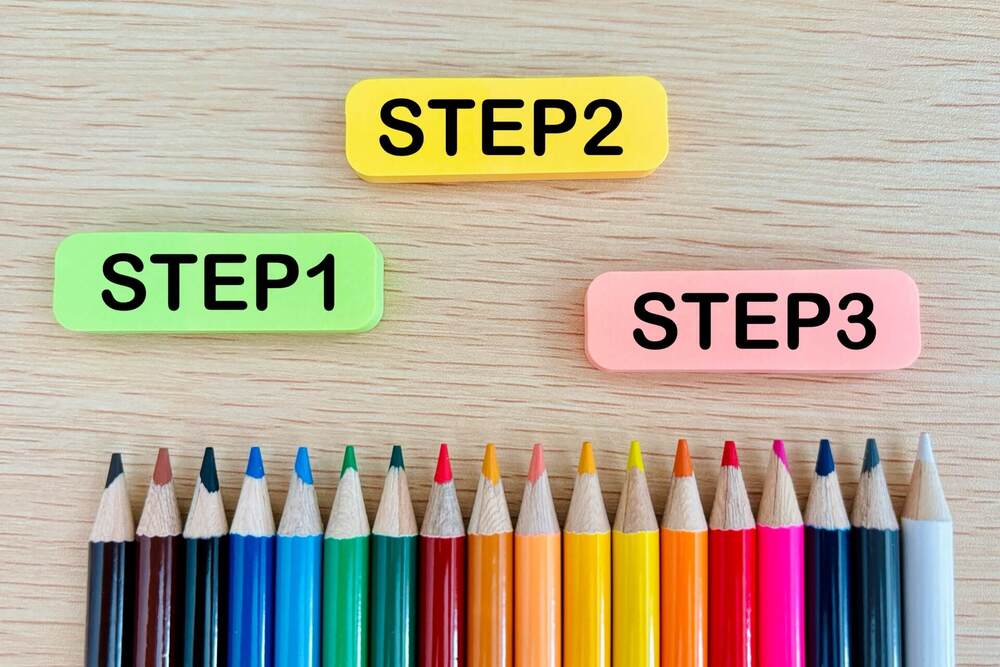
エンジニアが転職したいと考えるならば、まずは十分に準備しなければなりません。いきなり転職活動を始める人は見受けられますが、準備が不足すると期間が長引いたり失敗したりする原因となってしまいます。今回は、エンジニアが転職を成功させるために、必要な準備や具体的な転職活動のステップについて解説します。


エンジニアが転職したいと考えるならば、まずは十分に準備しなければなりません。いきなり転職活動を始める人は見受けられますが、準備が不足すると期間が長引いたり失敗したりする原因となってしまいます。今回は、エンジニアが転職を成功させるために、必要な準備や具体的な転職活動のステップについて解説します。

If an engineer wants to change jobs, he or she must first be well prepared. Although it is common to see people who begin their job change activities out of the blue, lack of preparation can lead to a prolonged period of time and failure. In this article, we will explain the necessary preparation and specific steps for engineers to take in order to successfully change jobs.

システムエンジニアやWebエンジニアが転職する際は、事前の準備が重要です。やるべきことはいくつもありますが、まずは以下の準備から取り掛かりましょう。
エンジニアとして転職活動を進める前に、概要について理解することが大切です。例えば、以下で解説するように転職活動の流れやステップについて把握したり、必要な資料を準備したりすることが求められます。概要を理解できていなければ、自分が何をすべきか判断できません。
ただ、転職活動で必要とされる作業は、人によって少々異なります。例えば、日頃からポートフォリオを作っているならば、転職に向けて準備する書類の内容が変化するでしょう。転職活動のために改めて作成する必要はなく、既存の資料を必要に応じて修正するだけで済むのです。
転職活動の概要を理解しなければ、これから何をすべきであるのか全くイメージできません。転職に向けた計画の立案にも影響が出るため、まずは概要の理解から始めましょう。
転職活動には意外と期間を要し、3ヶ月から6ヶ月は見込んでおいた方が良いでしょう。これよりも早く完了することはありますが、余裕を持って計画的に進めることが大切です。余裕のないスケジュールにしてしまうと、焦って転職先を決定することになりかねません。また、転職先が決まる前に退職してしまい、キャリアにブランクが生じることも考えられます。例えば以下のように考えると良いでしょう。

ただ、あまりに長い期間を見込むのは望ましくありません。長くなればなるほど、転職活動が面倒になってしまう可能性があります。準備に時間をかけられるぐらいの期間は見込んでおかなければなりませんが、長くとも6ヶ月で終わらせるようにしましょう。
転職してからの将来像を明確にして、それに向けたスキルを習得しましょう。例えば、現在のスキルを将来的にクラウド環境でも活かしたいならば、AWSなど主要なクラウドサービスのスキルを習得します。書籍での学習やインターネットのコンテンツ、動画サイトでの解説などスキルアップの方法は多種多様です。
一般的に、転職を成功させるためには、転職先で即戦力になれるスキルを持っておかなければなりません。つまり、転職段階で保有しているスキルが自分の将来像と乖離していると、将来像とは違うポジションで働くことになりかねないのです。逆に、準備としてキルアップに励めば、思うようなポジションに転職しやすくなります。
転職活動を始める際には、職務経歴書や履歴書を作成しなければなりません。これらの書類を作成するためには、自己分析が必要であるため、準備としてそれぞれ力を入れて取り組みましょう。
まず、職務経歴書を作成するためには、今までに参画したプロジェクトとその時に利用した技術、自分のポジションを明確にしなければなりません。できるだけ細かく時系列に沿って記述すべきであるため、誤りがないように思い出して作成していきましょう。曖昧な部分があるならば、当時のメールを参照するなどして、虚偽が含まれないように作成すべきです。
また、並行して自己分析にも力を入れていきましょう。例えば、職務経歴書を作成する過程で、以下が見えてくると考えられます。
自分が得意な部分を武器に転職活動を進める必要があるため、職務経歴という事実に基づいてまずは分析します。
また、今までの経験が転職先でどのように活かされるのかどうかも分析しましょう。例えば「20人以上のプロジェクトに何度も参画しているため転職後に参画するプロジェクトでも活躍できる」などです。自分のスキルについて分析するだけではなく、経験についての分析にも力を入れなければなりません。
転職先の候補についてできるだけ多くの情報を集めましょう。転職活動・就職活動を問わず、企業についての情報を集めることは、基本中の基本となる準備です。準備不足が採用担当者に伝わってしまうと、転職に失敗する可能性が高いと表現しても過言ではありません。
情報を収集するためには、転職先候補のWebサイトを閲覧する方法が手軽かつ正確です。公式に示されている企業理念・事業内容・会社の強みなどをそれぞれ確認していきましょう。誰でも閲覧できる情報であるため、ここに記載されている内容を理解できていないと、準備不足であると判断されてしまいます。
また、リアルな情報を収集するならば、口コミサイトなどを参考にするのも良いでしょう。例えば、退職者が情報を共有するWebサイトがあるため、そのようなサイトで情報を収集します。全てが事実とは限りませんが、気になる部分があれば、面接の場で質問すれば良いのです。

When a systems engineer or web engineer changes jobs, it is important to prepare in advance. There are a number of things you need to do, but let's start with the following preparations.
Before you begin your job search as an engineer, it is important to understand the outline of your job search. For example, as explained below, you will need to understand the flow and steps of the job search process and prepare the necessary materials. If you do not understand the outline, you will not be able to determine what you need to do.
However, the tasks required for a job search vary a bit from person to person. For example, if you are creating a portfolio on a regular basis, the documents you prepare for a job change will vary. You do not need to create it anew for your job search; you only need to modify your existing materials as needed.
Without an overview of your job search, you will not have a clear picture of what you need to do. This will affect your planning for your job change, so start with an overview.
It takes a surprisingly long time to change jobs, and you should expect to spend between three and six months on the job search. Although it is possible to complete your job search sooner than this, it is important to plan ahead and allow yourself plenty of time. If you set a schedule that does not allow enough time, you may end up deciding on a new job in a hurry. Also, you may end up leaving your job before you have decided on a new one, creating a blank in your career. For example, consider the following

However, it is not advisable to anticipate too long a period of time. The longer you wait, the more tedious the job search may become. You should allow enough time to prepare, but try to finish within six months at the most.
Clarify your vision of your future after changing jobs, and acquire the skills to achieve it. For example, if you want to use your current skills in a cloud environment in the future, acquire skills in AWS and other major cloud services. There are a wide variety of ways to improve your skills, including learning from books, Internet content, and video sites.
In general, in order to successfully change jobs, you must have skills that will make you immediately effective in your new position. In other words, if the skills you possess at the stage of changing jobs are out of step with your future vision, you may end up working in a position that is different from your future vision. On the other hand, if you work hard to improve your skills in preparation, it will be easier to change jobs to the position you want.
When you begin your job search, you will need to create a work history and resume. In order to create these documents, you will need to analyze yourself, so focus your efforts on each in preparation.
First, in order to create a resume, you must clearly identify the projects you have participated in, the technologies you have used, and your position. The description should be as detailed as possible and in chronological order, so remember to create it without any errors. If there are any ambiguous parts, it should be prepared in such a way that it does not contain any falsehoods, for example, by referring to e-mails from that time.
In parallel, you should also focus on self-analysis. For example, in the process of preparing your resume, you may find the following
Since you need to use your strengths as a weapon in your job search, analyze them first based on the facts of your work history.
Also, analyze how your past experience will be utilized in your new company. For example, "I have participated in many projects involving more than 20 people, so I will be able to play an active role in the projects I participate in after my new job. In addition to analyzing your skills, you must also focus on analyzing your experience.
Gather as much information as possible about your potential new employer. Regardless of whether you are changing jobs or finding a new job, gathering information about the company is the most basic preparation you can do. It is no exaggeration to say that if a lack of preparation is communicated to the hiring manager, there is a high possibility that your job change will fail.
The easiest and most accurate way to gather information is to visit the website of the potential employer. Check each company's officially stated corporate philosophy, business activities, and strengths. Since this information is available to anyone, if you do not understand what is described here, you will be judged to be ill-prepared.
Also, if you want to gather realistic information, you may want to refer to word-of-mouth websites. For example, there are Web sites where retirees share information. Not all of it may be true, but if you have any concerns, you can ask questions at the interview.

転職活動の詳細は人によって違いますが、今回は一般的な流れやステップを紹介します。
最初に転職活動に向けた準備が必要です。上記で解説した通り、転職活動について理解したり、転職に向けた自己分析などを進めていきましょう。転職活動では、どれだけ丁寧に準備できるかが成功するかどうかを左右するため、面倒かも知れませんが時間をかけて対応しましょう。転職期間のうち、最初の1ヶ月程度は準備に時間を割いても差し支えありません。
準備すべきことはいくつもありますが、その中でも力を入れるべきは将来像の明確化と自己分析です。ここが決まっていなければ、どのような求人に応募するのかの決め手がなくなってしまいます。また、面接の場で「なぜその求人に応募し将来的にどうなりたいのか」「今までの経験がどのように活かされるのか」などの質問に答えづらくなるのです。
エンジニアが転職先の求人を見つけ出す方法はいくつもあります。具体的な支援サービスは以下で紹介しますが、以下の中からどれを利用するか決定しておきましょう。
一般的には、求人サイトや転職エージェントを利用します。また、ひとつのサービスだけではなく、複数のサービスを併用することも可能です。
求人を見つける方法を決定する際は、自分がどれだけ転職活動に時間を割けるのかを踏まえなければなりません。時間的に余裕があるならば求人サイト、余裕がないならば転職エージェントをおすすめします。
応募したいと感じる求人が見つかったならば、求められている書類を準備しましょう。事前に、職務経歴書などは準備できていると思われますが、応募先に合わせて微調整しなければなりません。例えば、募集されている人材像に適した経験を持っているならば、その部分の内容を濃くした職務経歴書に修正するのです。
また、場合によっては指定されたフォーマットで書類を提出しなければなりません。このときは、事前に用意しておいた内容を所定のフォーマットへ差し替えるなど準備しましょう。なお、エンジニアが職務経歴書を作成する際は、以下のポイントを意識してください。
これらが全てではありませんが、最低限、これらのポイントを意識することで担当者からの評価を高められます。
求人へと応募した後には面接があります。企業を訪問しての面接とWeb面接のどちらも考えられるため、指定された方法に応じた準備や対策を進めましょう。面接ではよくある質問が存在するため、それらに回答できるように内容を考える作業が必要です。例えば以下のとおりです。
【1次面接】
【2次面接】
また、面接に慣れていない場合は、マナーなども確認しておいた方が良いでしょう。受け答えだけではなく、面接の開始から終了まで幅広く評価されるため、悪い印象を与えるような行為は避けなければなりません。
面接に備えた対策を講じたならば、あとは面接を迎えるだけです。人によっては、面接のように人と話す行為に緊張するかもしれませんが、落ち着いて対応しましょう。しっかりと準備ができていれば、後はその内容を面接官へと伝えるだけです。予期せぬ質問が飛んでくる場合もありますが、焦らず少し時間を要しても落ち着いて対応していきます。面接はオンライン・オフラインのどちらも考えられるため、以下を意識してください。
近年はオンライン面接が増えているため、以下の流れを踏まえた準備が必要です。
オンライン面接が増えている中で、オフライン面接も消えてはないため、以下のとおり進めていきます。
面接まで完了したならば、あとは面接結果を受領するだけです。結果が出るまでの期間は、面接が終了する際に伝えられることが多いため、確認しておきましょう。数日で連絡が来ると思われますが、求人への応募者が多い場合は時間を要する可能性はあります。期日までに連絡が来ない場合、結果について問い合わせしなければならないことがあるため、聞き逃さないようにしなければなりません。
面接に合格した場合は、内定を承諾するかどうか伝えなければなりません。多くの場合、承諾することになるとは思われますが、複数の会社へ応募している場合は断ることもあるでしょう。その場合は、以下のポイントで優先順位をつけるべきです。
何を重視すべきかは人によって異なるため一概にはいえません。自分なりに納得できる優先順位を用意しておきましょう。
なお、どうしても断らなければならない場合は、丁重に対応することが重要です。適当な対応をしたり連絡を無視したりすると、言うまでもなく印象を悪くしてしまいます。

While the details of a job search vary from person to person, we will introduce the general flow and steps involved in this process.
First, you need to prepare for your job change. As explained above, you will need to understand the job change process and conduct self-analysis in preparation for your new job. Although this may be tedious, take the time to deal with it, because how carefully you prepare for your job change will determine whether or not you will be successful. It is acceptable to devote the first month or so of your job change period to preparation.
There are a number of things to prepare for, but the two most important things to focus on are clarifying your vision of the future and self-analysis. If you do not have a clear vision of your future, you will not be able to make a decision on what kind of job to apply for. It will also make it difficult to answer questions such as "Why did you apply for this job and what do you want to do in the future?
There are a number of ways for engineers to find new job opportunities. Specific support services are listed below, but it is important to decide which of the following you will use.
Generally, job sites and recruitment agents are used. It is also possible to use more than one service at the same time.
When deciding how to find jobs, you must take into account how much time you can devote to your job search. If you have the time to spare, we recommend using a job site; if not, we recommend using a recruitment agency.
Once you have found a job that you feel you would like to apply for, prepare the required documents. You may have already prepared your resume and other documents, but you will need to fine-tune them to suit the position you are applying for. For example, if you have experience that is suited to the type of person they are looking for, you may want to revise your resume to make it more detailed in those areas.
In some cases, you may have to submit documents in a specified format. In such cases, you should prepare by replacing the content you have prepared in advance with the specified format. Engineers should keep the following points in mind when preparing a resume.
These are not exhaustive, but at the very least, these points will help you to be more highly regarded by the person in charge of your application.
After applying for a job, you will have an interview. Since both in-person and web interviews are possible, you should prepare for and take steps to prepare for the interview according to the method specified. Since there are common interview questions, you need to work on thinking about the content of the interview so that you can answer them. For example
First round interview
Second interview
If you are not used to interviewing, you may also want to check your mannerisms. You will be evaluated extensively from the beginning to the end of the interview, not just your delivery, so you should avoid any behavior that could give a bad impression.
Once you have taken steps to prepare for the interview, all that remains is to get to the interview. Some people may be nervous about the act of talking to others, as in an interview, but you should remain calm. If you are well prepared, all you have to do is communicate that information to the interviewer. Unexpected questions may come up, but do not rush and respond calmly, even if it takes a little time. Since interviews can be conducted both online and offline, please be aware of the following
Online interviews have been increasing in recent years, so you need to prepare based on the following process.
While online interviews are increasing, offline interviews are not disappearing, so proceed as follows
Once the interview is complete, all that remains is to receive the interview results. Check to see how long it will take to receive the results, as you will often be told when the interview is over. It is expected that you will hear from us within a few days, but if there are many applicants for the position, it may take longer. If you do not hear from them by the due date, you may have to inquire about the results, so you must make sure you do not miss anything.
If you have passed the interview, you must tell them whether or not you accept the job offer. In most cases, you will probably accept, but if you are applying to more than one company, you may decline. In that case, you should prioritize the following points
It is difficult to generalize what should be emphasized as it depends on each person. Be sure to prepare a list of priorities that you are comfortable with.
If you must decline a position, it is important to respond politely. Needless to say, if you respond inappropriately or ignore the contact, you will make a bad impression.

エンジニアが転職するにあたっては、支援サービスを活用すべきです。いくつも選択肢がありますが、利用する機会が多い順に紹介します。
転職といえば、一般的に求人サイトで情報を収集するでしょう。エンジニアは非常に多くの企業で求められているため、求人サイトを確認すれば自分が活躍できそうな求人を見つけられます。求人の検索や絞り込み機能が設けられているため、自分のスキルや経験、処遇などの条件を入力して転職先候補を探し出すのです。
無料で利用できるものが多く気軽に活用できますが、自分自身で検索しなければならないことがネックになりがちです。特に現役エンジニアとして働きながら転職活動を進める場合、求人の検索に長い時間を割けないと考えられます。自分で検索するからこそ自由という考え方もありますが、負担が大きくなる場合があるため注意は必要です。
転職エージェントは、事前に必要な情報を登録しておくことで、求人を探したり紹介したりしてもらえるサービスです。求人サイトは自分で探し出す必要がありますが、転職エージェントはその手間が発生しません。事前に情報を提供するなど準備は必要ですが、活用するエンジニアが増えています。
事前にエンジニアとしてのスキルや希望を伝えておくため、条件に合致しない求人が提示されることはありません。転職サイトでは、絞り込みしつつ詳細を自分で確認する必要がありますが、そのような手間は一切ないのです。非常に時間効率の良い支援サービスだといえます。
また、転職エージェントを利用すると、面接日程の調節など各種事前準備にも対応してもらうことが可能です。このような調節作業は、手間がかかりやすい部分ですが、転職エージェントならば概ね任せられます。
経験が少ないエンジニアの場合、しっかりと準備しても思うような求人が見つからない場合があります。この時は、ハローワークの求人も参考にしてみましょう。ハローワークであれば、未経験や初心者でも応募できる求人が存在するため、求人サイトや転職エージェントよりも転職先が見つかる可能性が高まります。
ただ、ある程度のスキルがあるならば求人サイトや転職エージェントで転職先を見つけた方が良いと考えられます。もし、応募条件に少し満たないぐらいであれば、転職準備としてスキルアップしてから改めて転職先を探すことも検討してください。
今までエンジニアとして働いていない場合は、公的な支援を受けて転職する方法があります。例えば、厚生労働省はIT分野の職業訓練を提供しているため、これを受講してスキルアップすれば転職が可能です。ただ、これは今回解説する中では例外的な方法であるため、このような転職方法もあるということだけ知っておくと良いでしょう。

Engineers should use support services when changing jobs. There are a number of options available, but we will introduce them in the order of most frequent use.
When it comes to changing jobs, you will generally gather information from job sites. Engineers are in great demand by many companies, so you can find jobs where you might be able to make a difference by checking job sites. Many of these sites are free and easy to use, but you must do your own search to find a job.
Many of the sites are free and easy to use, but the fact that you have to search by yourself tends to be a bottleneck. Especially if you are working as an engineer, you may not be able to spend a lot of time searching for jobs. Some people think that because you search on your own, you are free to do so, but be aware that this can be a heavy burden for you.
A recruitment agent is a service where you register the necessary information in advance and they will search for and introduce you to job openings. While job sites require you to search for jobs on your own, a recruitment agent does not. Although some preparation is required, such as providing information in advance, more and more engineers are taking advantage of this service.
Because you provide information about your skills and hopes as an engineer in advance, you will not be presented with jobs that do not match your requirements. With job search sites, you have to check the details yourself while narrowing down your search, but there is no such hassle at all. This is a very time-efficient support service.
In addition, the recruitment agency can also help you with various advance preparations, such as arranging interview dates. Such adjustments can be time-consuming, but with a recruitment agent, you can generally leave the work to them.
Engineers with limited experience may not be able to find the job they are looking for, even if they have prepared well. In this case, you can also refer to Hello Work for job openings. Hello Work has more job opportunities for inexperienced or novice applicants than job sites or recruitment agencies.
However, if you have some skills, it is better to find a new job on a job site or with a recruitment agent. If you do not meet the requirements, you may want to consider improving your skills in preparation for a new job and then looking for a new job.
If you have not worked as an engineer before, there are ways to change jobs with public support. For example, the Ministry of Health, Labor and Welfare provides job training in the IT field. However, this is an exception to the rule, so it is best to know that there are other ways to change jobs.

エンジニアが転職を準備する際には、以下のポイントを意識するようにしてください。
エンジニアが転職する際は、可能な限り現職を続けながら転職活動も進めましょう。事前に退職しておいて、転職活動に専念する方法もありますが、基本的にこの流れはおすすめできません。負担は大きくなってしまいますが、働きながら準備したり希望する企業へ面接に行ったりして、転職活動を進めるべきです。
現職を続けながら転職活動も進める理由は、可能な限りキャリアにブランクを作らないためです。日本では、働かない期間があると評価が下がってしまう傾向にあるため、現職を続けながら転職活動しなければなりません。転職活動に専念すると、ブランクがあることで評価が下がり、転職先が見つからないという状況に陥ります。
ただ、現在の職場が多忙すぎるなど、転職活動と並行できないこともあるでしょう。このような場合は、退職してから転職活動に専念することも悪い選択ではありません。悩むことがあるならば、まずは転職エージェントへ登録し、アドバイスをもらっても良いでしょう。
転職に際して企業を退職するならば、遅くとも1ヶ月前には申し出ましょう。就業規則でタイミングについて明記されているならば、それに従って退職の手続きを進めます。退職手続きも転職に向けた準備であるため、ないがしろにしてはいけません。
退職を申し出た後は、現在の業務を誰かに引き継ぐ作業が必要です。何かしらの資料を作成したり、後任者へ業務を説明したりしていきましょう。転職するからといって、引き継ぎなどの準備を全くすることなく退職することは避けるべきです。
意外にもエンジニアの世界は狭いため、準備せずに転職してしまうと悪い噂が広がる可能性があります。1ヶ月前には退職を申し入れて、引き継ぎを済ませてから退職することを心がけましょう。
エンジニアが転職活動を進める際は、転職エージェントの活用をおすすめしています。転職サイトで求人を見つけ出すことは可能ですが、負荷を軽減するためにも転職エージェントへ登録し、支援を受けるようにしましょう。
登録候補となる転職エージェントはいくつもありますが、エンジニアに特化したサービスがおすすめです。エンジニアは専門的な職種であるため、担当者にも十分な知識がなければ転職が成功しません。エージェント選びは、転職準備の一環であるため、自分に適したサービスを見つけ出すようにしましょう。
なお、場合によっては国内系サービスと外資系サービスなど、ふたつに登録する選択肢もあります。複数に登録すると、担当者とのやり取りが面倒になることはありますが、思いがけない求人を提示してもらえることもあるのです。

Engineers should keep the following points in mind when preparing for a career change
When changing jobs, engineers should continue to work at their current position as long as possible while also pursuing their job search. Although there is a method whereby you can quit your current job beforehand and concentrate on your job search, we basically do not recommend this approach. Although it may be more burdensome, you should prepare for your new job and go to interviews with the company of your choice while you are still working.
The reason why you should continue to work while also looking for a new job is to avoid creating a blank in your career as much as possible. In Japan, a period of time without work tends to be evaluated negatively, so you must continue to work while changing jobs. If you focus on changing jobs, your evaluation will be lowered because of the blank period, and you will not be able to find a new job.
However, there may be times when you cannot concurrently change jobs, such as when your current workplace is too busy. In such cases, it is not a bad option to resign from your job and then concentrate on your job search. If you have any doubts, you may first register with a job search agent and ask for advice.
If you are planning to resign from a company when you change jobs, give at least one month's notice. If the company's employment regulations clearly stipulate the timing of your resignation, you should proceed with the resignation procedures accordingly. Resignation procedures are also part of the preparation for a new job, and should not be neglected.
After you have tendered your resignation, you will need to hand over your current duties to someone else. You should prepare some documents and explain your duties to your successor. Just because you are changing jobs, you should avoid leaving without making any preparations for the handover.
The world of engineers is surprisingly small, and if you leave without preparation, bad rumors may spread.
We recommend that engineers use a recruitment agent to help them with their job search. While it is possible to find jobs on job search websites, it is also a good idea to register with a recruitment agent to reduce your workload and receive assistance.
There are a number of recruitment agencies that you can register with, but we recommend that you use a service that specializes in engineers. Engineers are specialized professionals, and your recruiter must be knowledgeable enough to help you find a job. Selecting an agent is part of the process of preparing for a career change, so be sure to find the right service for you.
In some cases, you may choose to register with two services, one domestic and one foreign-affiliated. Although registering with more than one service may make it more difficult to communicate with the person in charge, you may be presented with a job offer that you did not expect.

エンジニアの転職準備でよくある質問についてまとめていきます。
具体的な年収の差は企業の年収幅によって異なるため、明確な金額はお伝えできません。しかし、大学卒業者と非大卒者は一般的に、大学を卒業した方の方が非大卒者よりも高い年収が提示される可能性があります。学位の種類によっても変わるので企業の求めるスキルにマッチしているとより年収が上がりやすいです。
転職回数が多い場合も書いた方が良いですが、必ず履歴書に理由を書くと良いです。プロジェクトが終了した、契約が終わった、組織の変化などできるだけポジティブな要素を強調して書くことをおすすめします。
性格面ですと、コミューニケーション能力やポジティブな方とはやはり一緒に仕事をしたいと思っていただけるようです。あとは退職理由と志望動機に一貫性がある方は企業も納得のうえ、内定を出しやすいと考えられます。
ケースバイケースですが、日本の市場平均は約10%です。700万円以上など一番の希望を述べるのではなく、600-750万円などレンジで幅を持って伝えたり、700万円(相談可)など交渉幅を見せながらお申し込みすると良いとアドバイスしてます。
このようなしっかりしたこだわりがある場合は、営業とそれが可能なポジションなのかしっかり確認し、クリアになってからお申し込みして頂くようにしています。(後でミスマッチの原因になりえるので)
答えが変わる可能性がある質問なので、常にアップデートを心掛けていますが、下記の様に答えることが多いです。
売り手市場が続いている傾向にはあるが、ハード面/ソフト面両方を見られ厳しくジャッジされるケースがあり、競争率は高い傾向です。
もちろん企業やポジションによって変化しますが、C/C++、Python、JavaScriptが多く用いられています。

The following is a summary of frequently asked questions in preparation for an engineer's career change.
We cannot give you a definite amount because the specific difference in annual salary depends on the company's annual salary range. However, in general, college graduates and non-university graduates may be offered higher annual salaries than non-university graduates. It also depends on the type of degree you have, so you are more likely to earn a higher annual salary if you match the skills that the company is looking for.
You should write if you have changed jobs many times, but you should always include a reason in your resume. We recommend that you write about a project that has been completed, a contract that has ended, a change in organization, etc., emphasizing positive factors as much as possible.
In terms of personality, people who are communicative and positive are likely to want to work with you. Also, if you are consistent in your reasons for leaving and your reasons for applying for a job, companies are more likely to be convinced and make you a job offer.
It is a case-by-case basis, but the market average in Japan is about 10%, so instead of stating your highest expectations, such as 7 million yen or more, we advise you to make your application with a range of 6-7.5 million yen, or even 7 million yen (negotiable), while showing your negotiating range.
If you have such a firm commitment, we make sure to confirm with sales that this is a position that is possible for you, and ask you to apply only after it is clear. (This could cause a mismatch later on.)
Since the answer to this question is subject to change, we always try to update it, but we often answer as follows.
The market tends to be a seller's market, but there are cases where both the hard and soft aspects are looked at and judged strictly, and the competition tends to be high.
Of course, it depends on the company and the position, but C/C++, Python, and JavaScript are most commonly used.

エンジニアの転職にあたって、必要な準備から一般的な流れについて解説しました。転職活動を成功させるためには、事前の準備が重要です。意外と見落とされがちであるため、転職前には準備が必要であることを意識しましょう。
準備の中でも特に重要となるのは、経歴を整理したり自己分析したりする作業です。これらに力を入れなければ、転職活動で自分を強く訴求できません。求人に応募した理由の裏付けなどもなくなるため、まずは洗い出しやアピールポイントの明確化に力を入れてみましょう。

We have explained the necessary preparations and the general flow of an engineer's job change. Preparation in advance is important for a successful job change. Be aware that preparation is necessary before changing jobs, as it is often overlooked.
The most important part of the preparation is organizing your background and conducting self-analysis. Without putting in these efforts, you will not be able to make a strong case for yourself in your job search. You will also lose support for your reasons for applying for a job, so you should first focus on identifying and clarifying your appeal points.
